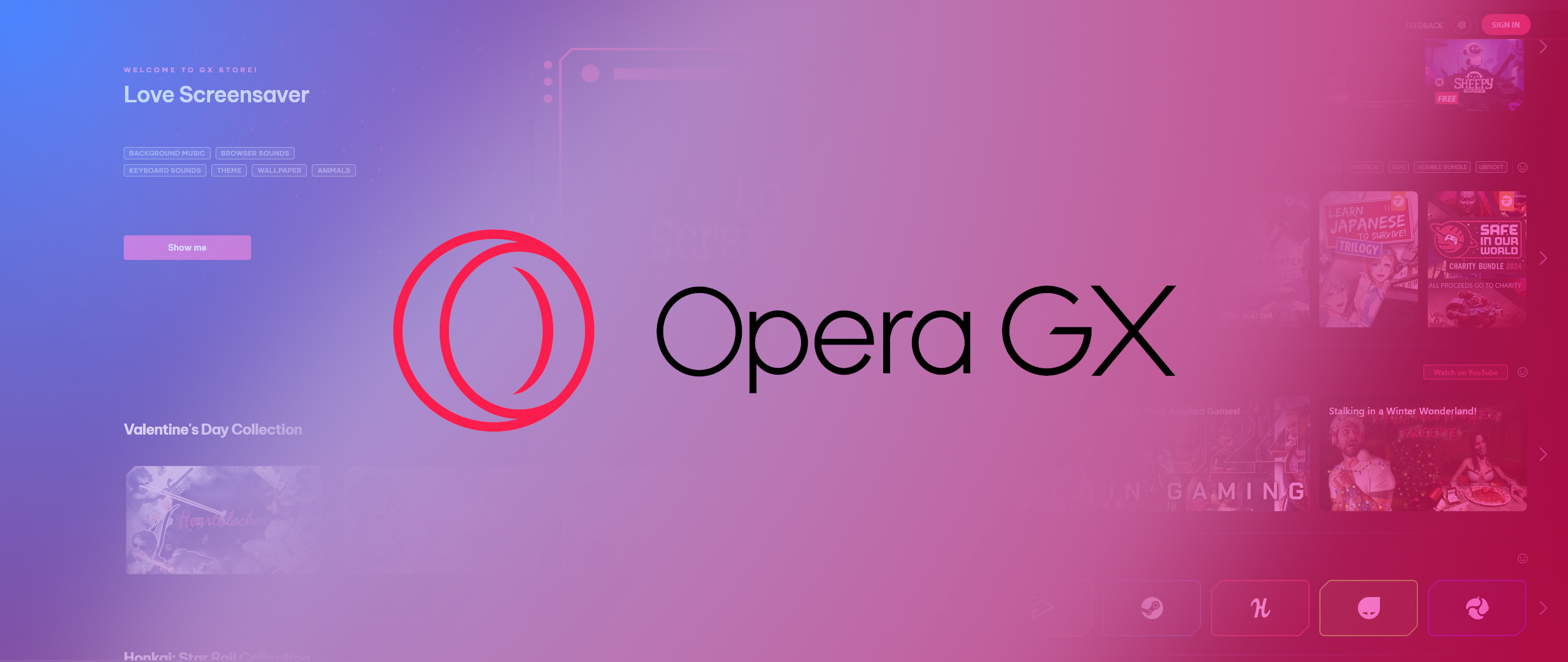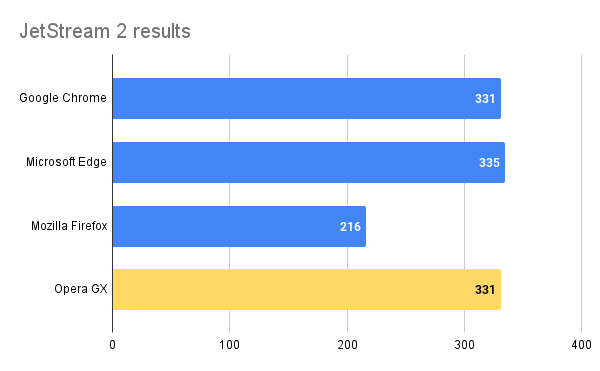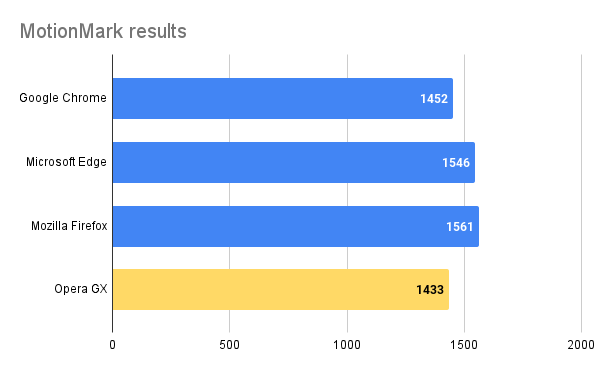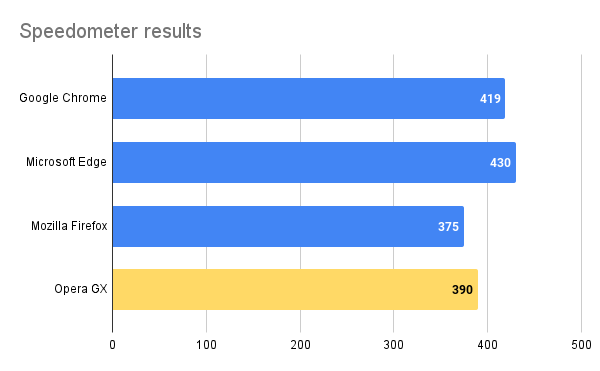Laptop Mag Verdict
If you’re looking for a new browser, something with a playful bite and a unique presence, then Opera GX should top your shortlist as a modern, speedy alternative that seeks to bring the fun back into browsing the web.
Pros
- +
RAM and CPU management
- +
Built-in VPN and ad blocker
- +
Interesting customization
- +
Popular app and RGB integration
- +
Crammed with cool features
Cons
- -
Maybe too crammed with cool features
- -
Gamer design is not for everyone
Why you can trust Laptop Mag
The Opera GX web browser has carved out quite an online identity for itself as of late. While some browsers are built and designed with speed, productivity, and efficiency in mind, someone at Opera sat down one morning and said, “Let’s let the person who runs the Wendy’s Twitter account make a web browser for gamers.” And by god, they’d better give that soul a raise.
Web browsers aren’t exactly the most exciting software you’ll install on your computer. There aren’t many people out there groaning in ecstasy over the latest build of Google Chrome, anyway. However, that hasn’t stopped Opera from being as excited as possible about a series of off-the-wall additions you’re unlikely to find in any other browser. At first, some of these additions seem utterly unhinged, but they’re pretty fantastic.
That’s not to say that Opera GX is solely a gimmick browser, although it does cram in so many of them that the software’s source code resembles the script of a mid-2000s WCW show booked by Vince Russo.
Admittedly, that’s a fairly niche reference to make. So, for anyone without an encyclopedic knowledge of the behind-the-scenes workings of a professional wrestling company that went out of business 20 years ago, let me try to offer something more contemporary:
Opera GX is a lot like Taylor Swift, versatile, adaptable, powerful, a great performer with a loyal fanbase, and it wouldn’t think twice about maniacally releasing an album’s worth of breakup songs trashing you if you ever dared to uninstall it.
Opera GX web browser: Design and customization
When it comes to design, Opera GX is polarizing. While its modern and flat UI isn’t exactly controversial, how it's delivered may well be. As a browser that markets itself towards gamers, Opera GX adopts the “gamer aesthetic” — a design principle that’s responsible for turning many a great gaming peripheral into something that resembles a codpiece for Optimus Prime.
When it comes to Opera’s GX browser, that gamer aesthetic is represented by Tron-like neon contrasts, dark color schemes, and something that emulates the science fiction-y vibe of video game menus. It’s a little cliche and, honestly, swims in big Doritos and Mountain Dew energy. It’s no eyesore, but it's not going to be for everyone.
Sign up to receive The Snapshot, a free special dispatch from Laptop Mag, in your inbox.
The browser’s layout consists of a vertical sidebar on the left-hand side that hosts shortcuts to GX features, AI chatbots, instant messengers, and various tools to juggle settings, manage your history, or access extensions. Along the top, you’ll find the traditional row of tabs keeping track of open pages with GX Corner being one tab pinned by default and readily accessible at all times.
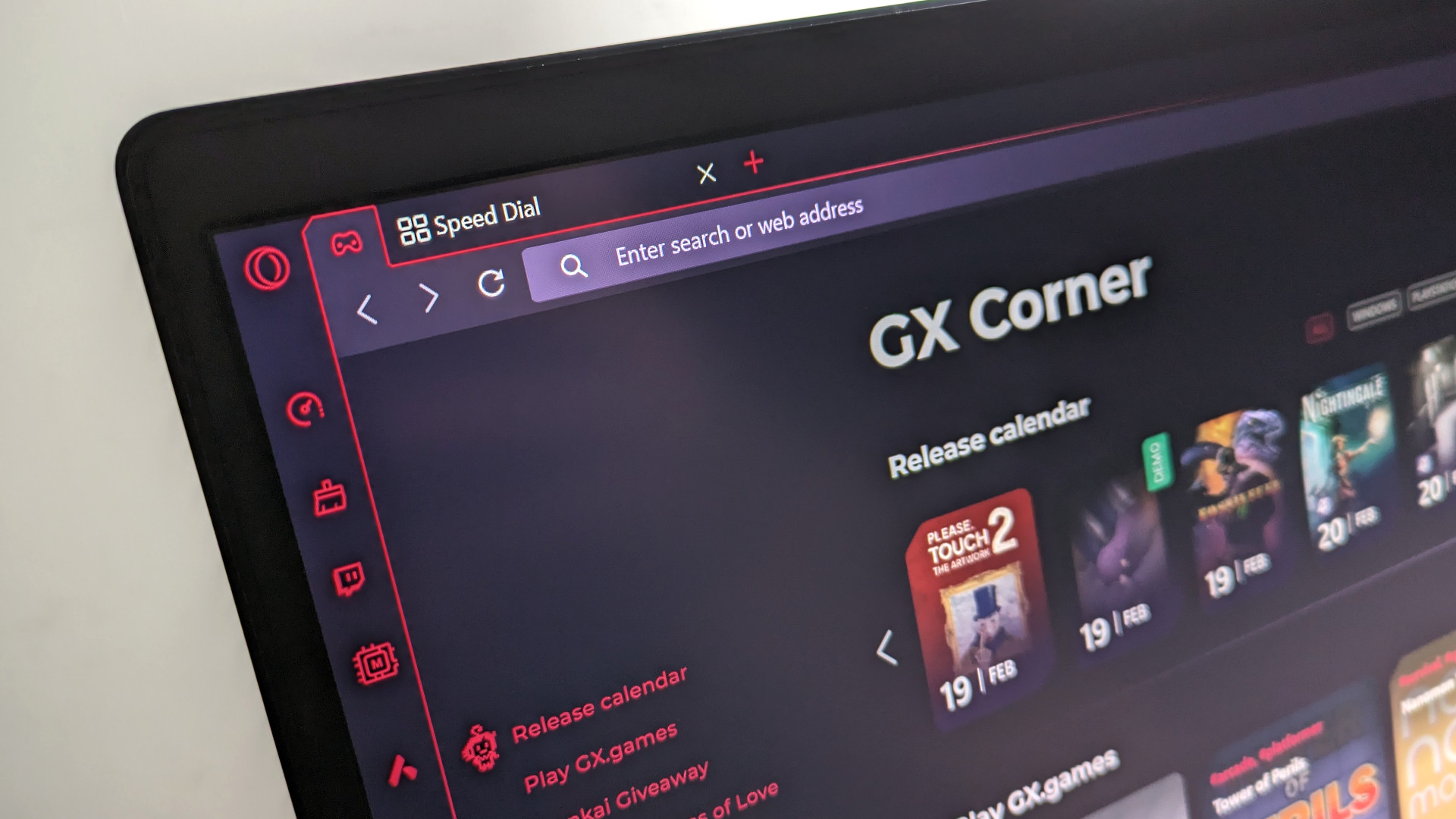
Below the tab row sits the address bar, with its back, forward, and refresh buttons all as you’d expect. To the right of the address bar itself sits nine icons that offer further shortcuts for things like page sharing, taking snapshots, adjusting privacy settings (namely ad or tracker blocking), and using extensions (again).
With this additional row of buttons, the interface can seem a little busy and intimidating at first. However, one of Opera GX’s key strengths is the flexibility it offers through customization. Select the easy setup button to the right of the address bar and you can quickly choose to toggle various buttons, widgets, and features on or off as you desire.
You’ll also be able to hop between light and dark modes (with an option to force dark mode onto pages that don’t have the option by default), create or apply custom themes, or apply “mods” — theme packs that blend themes with custom sounds, animations, and visual effects. You can even sync your RGB keyboard or mouse to the browser for a uniform lightscape across your setup.
It may not be the LEGO-like build-a-browser experience of something like Vivaldi, but there’s absolutely enough freedom. The ready-made content turns Opera GX into a browser that appeals to you in terms of visuals, comfort, and ease of use.
Opera GX web browser: Features
When it comes to features, I’m unsure if there’s any other browser that comes close. Opera GX is a real orchestra of bells and whistles, offering tons of useful tools that exist on a spectrum ranging from “absolutely essential” to “absolutely bonkers.” In fact, there are so many features available to GX users that it’s genuinely difficult to know where to begin.
Opera GX has the typical Chromium features you'd expect, such as easy password and bookmark importing. It also has the ability to force pages into dark mode for easier reading, and it has a mobile app for on the go browsing too. However, it's Opera GX's unique features that steal the show.
One of the most unique and impressive features to be found within Opera’s browser is GX Control — a fantastic resource manager that gives you detailed information about the performance impact of each tab as well as RAM, CPU, and network limiters to place a hard cap on how much of your computer’s resources Opera GX is allowed to access at any one time.
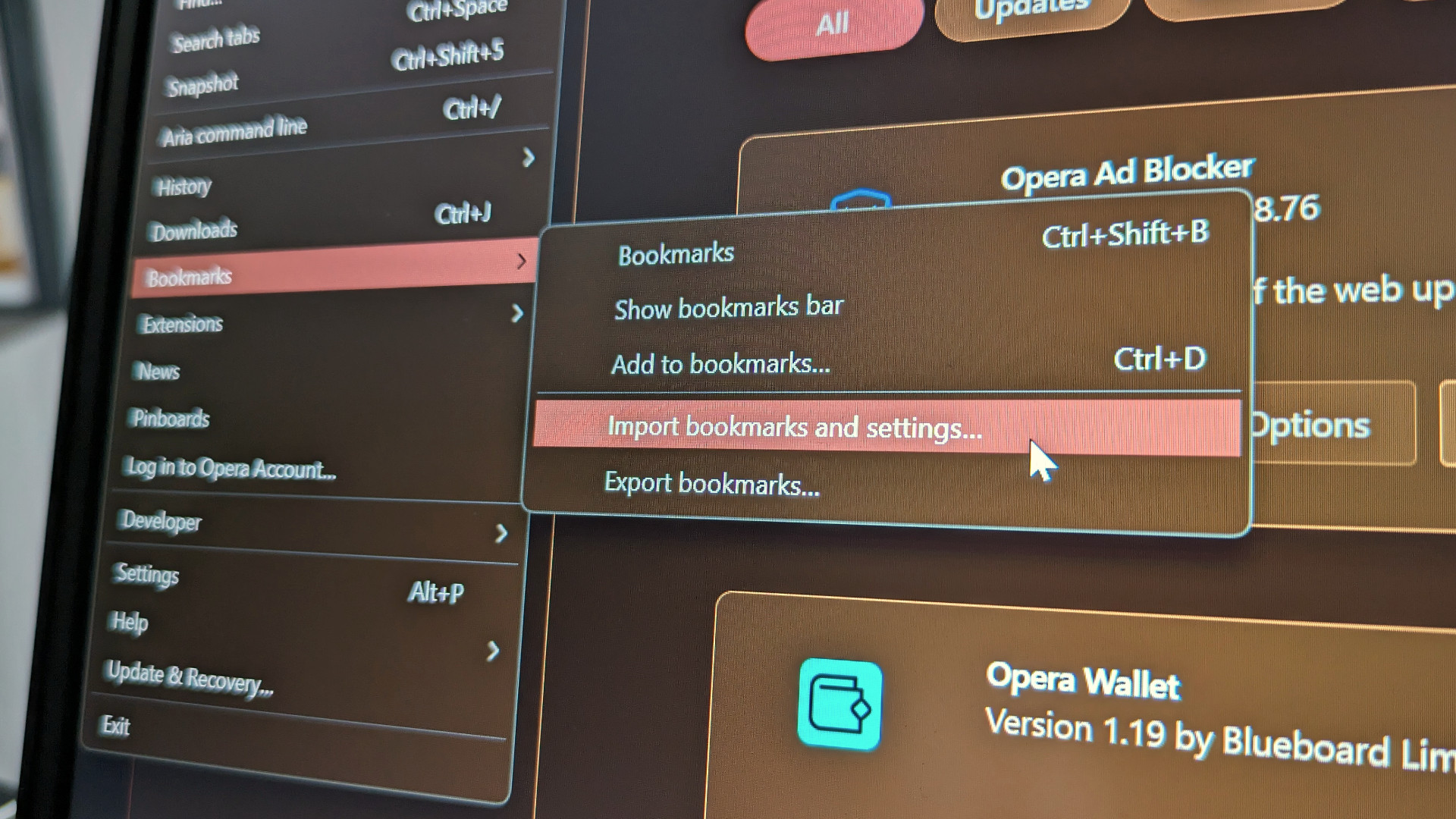
In an age where a multi-monitor setup is more common than ever, these limiters are incredibly useful for channeling performance in the right direction while multitasking. If you’re playing a game on one screen and want to look up a quick walkthrough on another, GX Controls are a clever way of making sure the browser won’t impact performance as you do.
GX Corner is similar to Chrome’s default “New Tab” start page, though packed with gamer-friendly content like a release calendar, short browser games to play, free game loot promotions, a deals aggregator, quick links to various game stores, trailers, demos, news and more. It feels a lot like an amalgamation of <Insert gaming news site here> and Google Discover, though there are no ads in sight — and no clickbait hot takes designed to get your syrup-like gamer blood pumping.
The browser’s integration of apps like Discord, WhatsApp, TikTok, Facebook Messenger, and Telegram are all welcome additions, readily accessible through Opera GX’s sidebar. These apps include notifications so you never miss a beat, and you can assign them to various keyboard shortcuts for even faster navigation.
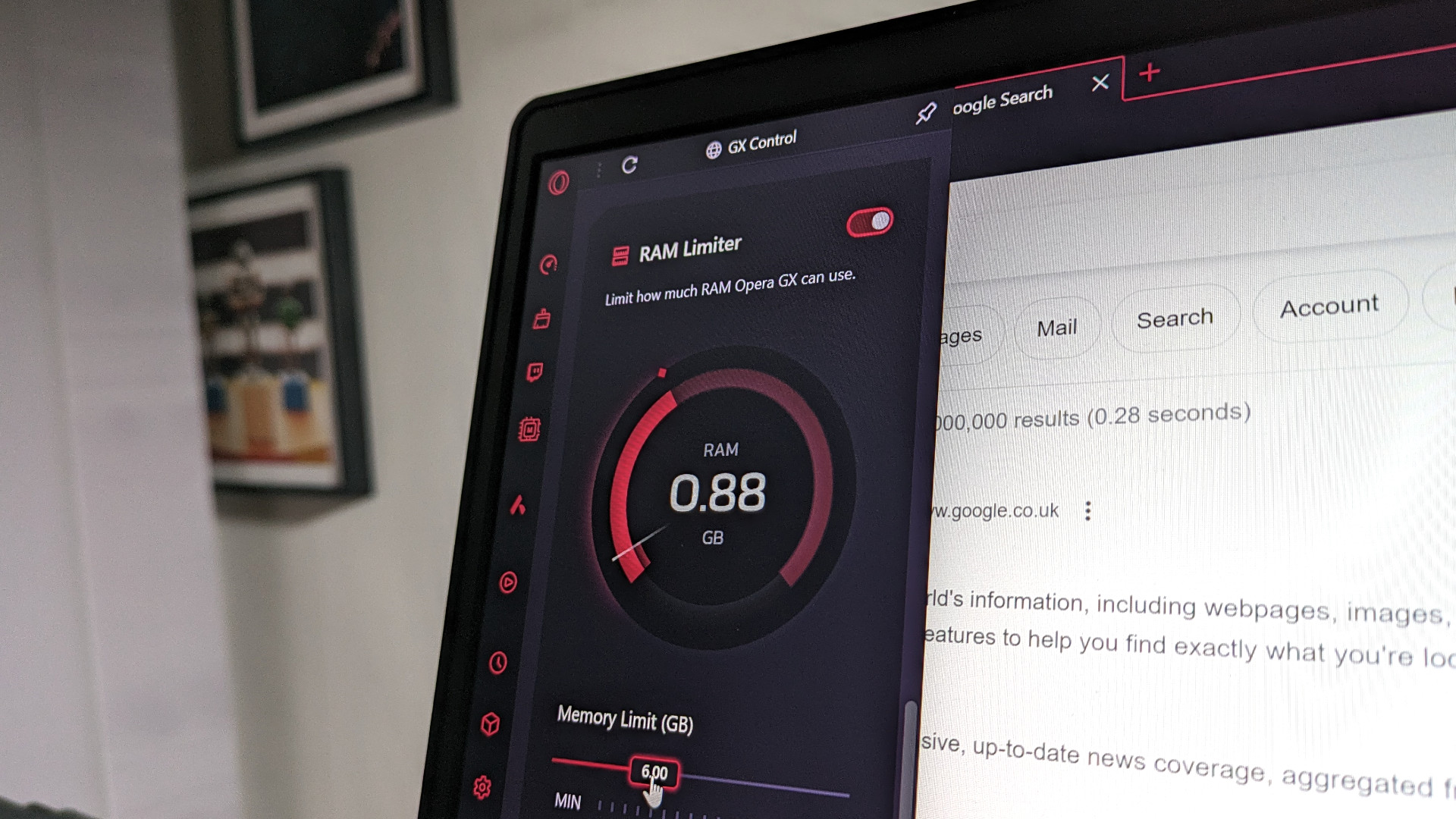
However, Opera GX also features similar quick access to several AI chatbots including ChatGPT, ChatSonic, and Opera’s own AI, Aria. Aria is a real-time LLM that can help with searches or drafting content online.
It’s free, and it’s fairly good, though it won’t hold a candle to some of the more advanced options out there, with their image generation abilities and cutting-edge models. Still, it’s a handy way to search and a quick way of pulling off conversions or generating insult ideas to appear sharp and smart in your next game-chat flame war.
A built-in media player also allows you to manage playlists across Apple Music, Spotify, YouTube Music, Deezer, and more. From here you can browse your online media library and listen to audio in the background without needing to run a separate app.
By default, Opera GX also includes a useful feature that displays currently playing media in a floating pop-up window when you switch tabs. This picture-in-picture offering is great for getting some work done while following along with YouTube videos in your periphery. Those videos can look even better thanks to Opera RGX, a feature that plays on the RTX on/off trend to sharpen videos and reveal finer details in real-time.
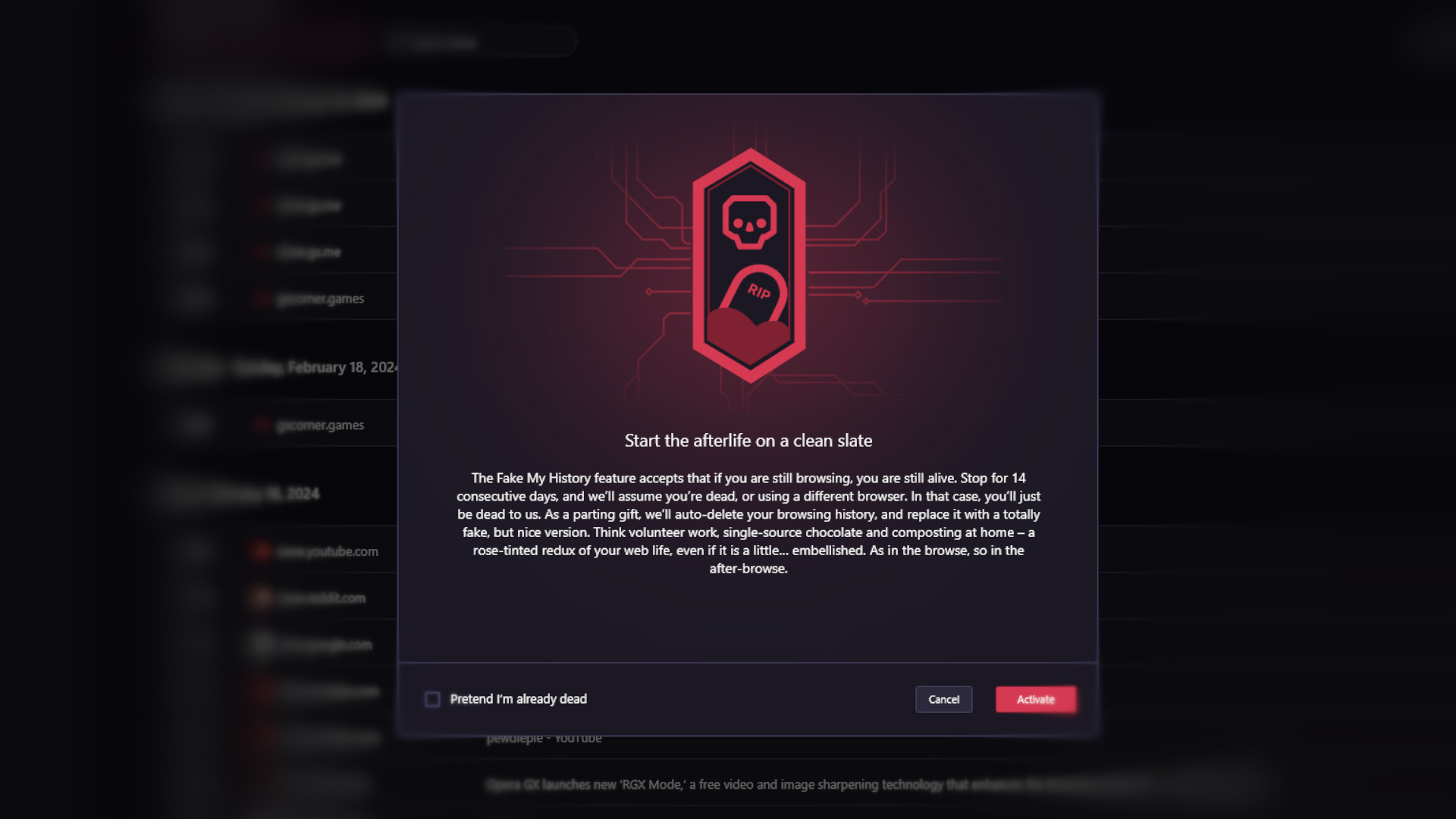
Then come the more bizarre additions to the browser, including the ‘upon my death’ history-based “Redeem my soul” feature which allows you to set up a 14-day killswitch on your browser history. Ensuring that your last words to friends or loved ones won’t have to be “Please, delete my browser history.”
Of course, finding a completely blank slate where your browsing history should have been would be suspicious, so Opera GX instead spoofs your browsing history with web searches for volunteer work, ethically sourced chocolate shopping sprees, and green-fingered gardening advice. Oh, what a saint they’ll suppose you were.
And, if you’re still alive and moments from being caught with something on your screen that might lead to others questioning your moral righteousness, then there’s also the Panic Button feature. Hitting your pre-configured panic key instantly replaces your current browser session with a new window directed to generic web pages like Wikipedia or Reddit, saving you from any potential embarrassment.
Not every feature is built around your sticky-handed antics on the web, some exist to help save you a considerable sum of cash too. Opera Cashback is another feature of the browser that can earn you monetary rewards simply through making online purchases as normal. For gamers, you can earn up to 7.5% cashback on purchases from Eneba, Kinguin, G2A, CDKeys, and more.
Opera GX web browser: Privacy and security
Opera GX also features a built-in ad blocker and free VPN, both of which come in impressively handy while browsing around, and barely impact overall performance in the slightest. While GX’s ad blocker is fairly solid, allowing for custom block lists and exception management, it’s no uBlock Origin (and it won’t block YouTube ads) but it's more than serviceable right out of the box.
Opera’s built-in VPN is similarly capable, offering a no-fuss solution for your privacy needs. Once enabled, users can change their virtual location by clicking the VPN button that appears at the start of the address bar.
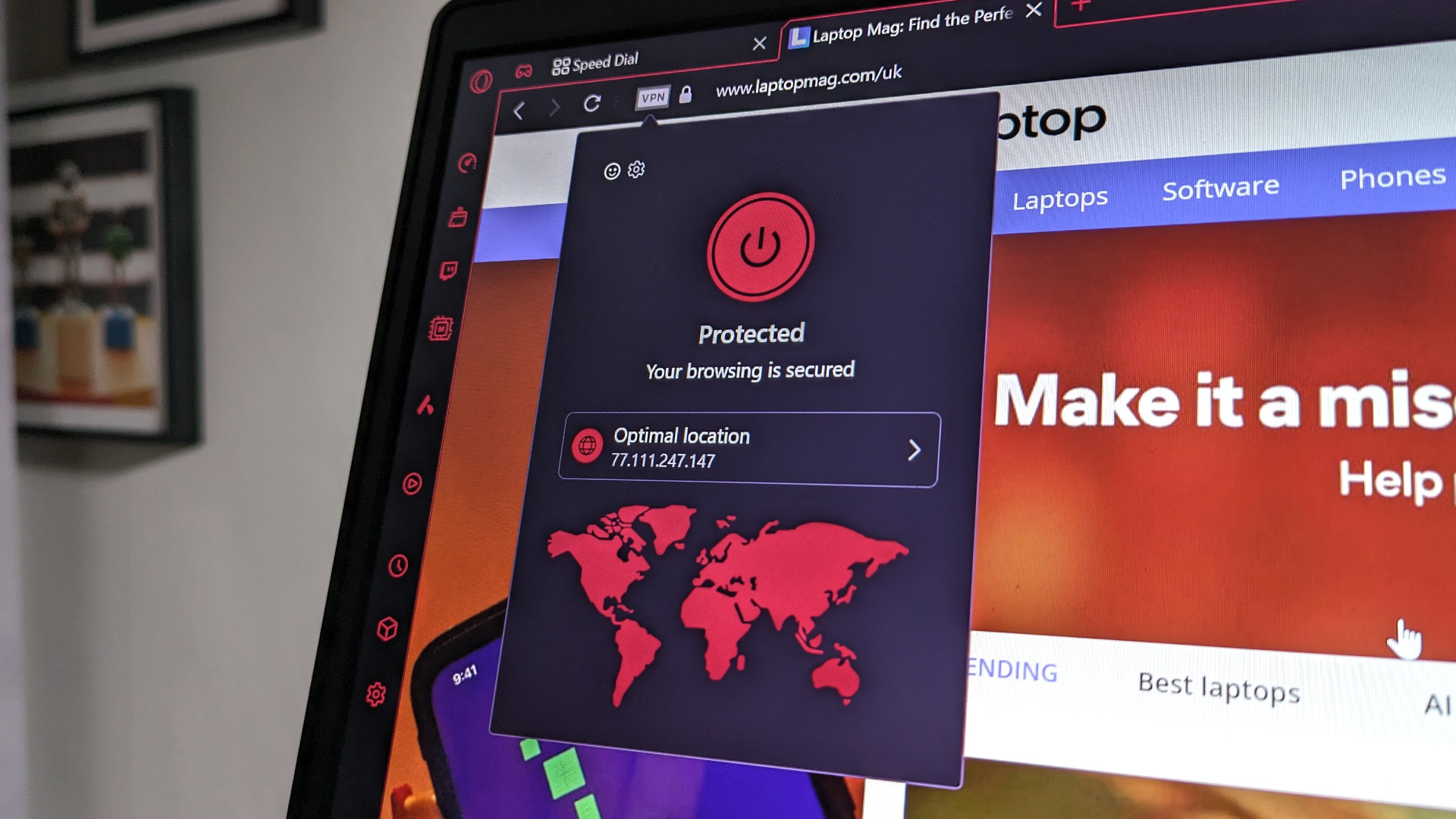
The number of available locations is limited, and connecting to them will noticeably impact your speed. I found that the VPN also struggled to bypass geo-restrictions for media on popular streaming sites, too. All in all, you get what you pay for on this one.
It handles the basics well enough and even includes a nifty setting to disable the VPN while using major search platforms to preserve the most accurate results. However, I doubt we could claim that this is one of the best VPN services around.
As a paid alternative, you can also subscribe to Opera’s VPN Pro for as little as $4 per month, or $48 per year, though this isn’t something we included in our review as it felt like a service that warranted its own coverage.
Opera GX web browser: Performance
Opera GX feels quite speedy, especially for a browser with so many additions tacked onto it. I never found myself frustrated with its handling of my daily browsing, even while juggling many busy tabs.
However, we tend not to review products by vibe alone. So, for a more precise look at how Opera GX performs against the competition, we ran the software through a series of benchmarks against other popular web browsers including Google Chrome, Microsoft Edge, and Mozilla Firefox.
To do this, we used a near-stock MSI Stealth 17 Studio A13V laptop outfitted with a 13th gen Intel Core i7 13700H CPU, Nvidia GeForce RTX 4060 GPU, and 16GB of RAM. The laptop’s display was capped at 60Hz and each benchmark was run using stock (as downloaded) browsers with their default settings.
| Microsoft Edge | 335 |
| Google Chrome | 331 |
| Mozilla Firefox | 216 |
| Opera GX | 331 |
JetStream 2 is a JavaScript and WebAssembly benchmark that tests browsers for their ability to run advanced web applications. Scores are based on the browser’s speed and smoothness for launching apps and executing code. Larger numbers indicate better results.
With Opera GX being a Chromium-based browser, you’d expect it to keep relative pace with similar Chromium operators. In fact, Opera GX (331) managed to draw even with Google Chrome (331) though both, barely, fell behind Microsoft Edge (335).
Surprisingly, Microsoft Edge took the top score, and Firefox’s non-Chromium Quantum/Gecko engine settled in last place with a much lower performance score of just 216.
| Microsoft Edge | 1,546 |
| Google Chrome | 1,452 |
| Mozilla Firefox | 1,561 |
| Opera GX | 1,433 |
MotionMark is a benchmark that assesses the graphical performance of a browser using complex in-browser animations at a set frame rate (in this case 60Hz). The higher the score, the better performing the browser was at delivering an overall smooth and capable graphical showcase.
Rebounding in style, Firefox took the top spot in the MotionMark benchmark scoring an impressive 1,561, closely followed by Microsoft Edge with 1,546. Both Chrome and Opera GX dip from these scores with Google’s browser in third place with 1,452 and Opera GX finishing last with 1,433.
| Microsoft Edge | 430 runs/min |
| Google Chrome | 419 runs/min |
| Mozilla Firefox | 375 runs/min |
| Opera GX | 390 runs/min |
Speedometer is a benchmark app that measures the responsiveness of web applications within a browser. It does so by simulating user actions such as adding, completing, and removing entries from a list of “to-do” items. Once again, a higher number is better, indicating more ‘runs’ (actions) per minute.
The Speedometer results once again put Microsoft Edge out in front attaining 430 runs per minute, with Google Chrome nipping at its heels with 419 runs per minute. Opera GX managed a commendable 390 runs per minute, coming ahead of Mozilla Firefox’s 375 runs per minute total.
In conclusion, Opera GX is a solidly performing browser, often maintaining the pace with its more popular contemporaries. If it wasn’t for the fact that Microsoft’s similarly feature-flush Edge browser was able to consistently rank high in each benchmark, I’d be inclined to say that GX’s feature-heavy load could be impacting performance in some way. And that may still be true. GX does have a considerable amount more of them to showcase than Microsoft’s browser, after all.
However, Opera GX still performed admirably across several key areas with scores that make it a more than healthy option. Especially when taking into account its performance against what is undoubtedly the world’s most popular browser: Google Chrome.
Bottom line
While Opera GX unabashedly wears its gamer affiliation on its sleeve, its rich feature set and depth of customization offer a unique and rewarding experience to all. From its app, RGB, and AI integrations to its resource limiters and free privacy and security options, Opera GX covers a wide range of computing needs and wants.
Performance-wise, it might not be the top scoring of our benchmarked selection, but it keeps pace with the best of them, and its real-world results aren’t sluggish in the slightest. If you’re looking for a new browser, something with a playful bite and a unique presence, then Opera GX should top your shortlist as a modern, speedy alternative that seeks to bring the fun back into browsing the web.

Rael Hornby, potentially influenced by far too many LucasArts titles at an early age, once thought he’d grow up to be a mighty pirate. However, after several interventions with close friends and family members, you’re now much more likely to see his name attached to the bylines of tech articles. While not maintaining a double life as an aspiring writer by day and indie game dev by night, you’ll find him sat in a corner somewhere muttering to himself about microtransactions or hunting down promising indie games on Twitter.
